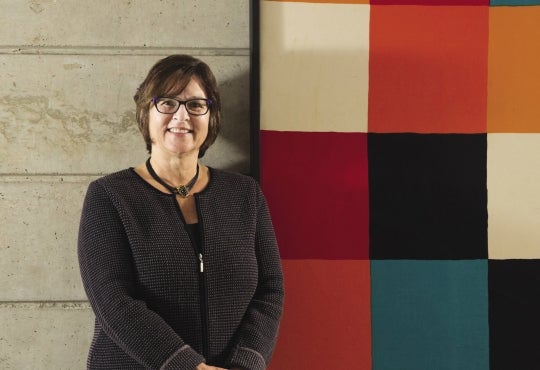The World University Service of Canada (WUSC) Student Refugee Program gives refugees a chance to attend university. The University of Waterloo is celebrating 10 years of sponsoring student refugees through WUSC.
A student sponsorship program that gives refugees a chance to attend university is one way to encourage young people to remain in high school while they’re living in refugee camps, says a Waterloo alumnus.
Gina Vukojevic, whose own family fled the wars in the former Yugoslavia when she was a child, studied International Development at the University of Waterloo. As part of her progam, Vukojevic spent eight months working in Dzaleka, a refugee camp in Malawi, where she saw first-hand the impact of the World University Service of Canada’s (WUSC) Student Refugee Program.
“Refugees in Malawi don’t have the right to work and they don’t have freedom of movement so young people in school feel trapped,” said Vukojevic. “The WUSC program was one reason some students stayed in school because it was their only hope of attending university.”
Waterloo Undergraduate students, through a $1 levy per term, have been sponsoring refugee students through WUSC for ten years.
Eleven students have been sponsored so far and Gráinne Ryder, staff advisor to Waterloo’s Student Refugee Program, based at St. Paul’s University College , says Waterloo hopes to welcome two more refugees in August - one from Syria and another from an African country.
Alone in a refugee camp, a young Rwandan student finds his way to Waterloo
 Gloire Gatabazi was born in Rwanda during the height of the civil war.
Gloire Gatabazi was born in Rwanda during the height of the civil war.
His family of six fled the country, settling as urban refugees in Nairobi, Kenya and living in one room on the little money his mother made sewing clothes. Gatabazi felt lucky, however, because it was better than living in the Kakuma refugee camp.
“All the news we got about the camp was scary. It’s a desert. We heard about scorpions, and how there was very poor healthcare. My mother preferred to struggle in Nairobi with her kids.”
Then, Gatabazi heard about the World University Service of Canada (WUSC) Student Refugee Program, which helps refugees attend university. There was only one problem — he would have to live in the Kakuma refugee camp in order to be eligible to apply.
“I took a huge leap of faith and left my family to live in the refugee camp. I had heard all these frightening things but I really wanted to go to university,” says Gatabazi
After a 26-hour bus ride, Gatabazi arrived at Kakuma only to get very sick with malaria. He recovered, and a year later got the news that he would be studying at the University of Waterloo and living in residence at St. Paul’s University College.
“Getting that news was probably the happiest moment of my life. It wasn’t just going to Canada, but going to university. As a refugee you never know what your future will hold. We could never have afforded tuition.”
GLOIRE GATABAZI
Student hopes to return to the world’s largest refugee camp to help others

After Liban Farah’s family fled Somalia, they settled in Kenya in Dadaab, the world’s largest refugee camp.
“The challenge is to get out of the camp. Education is not great and you are confined to the camp. You can’t start a business. So many young refugees have the talent and the ability but they are so trapped, they lose hope.”
LIBAN FARAH
Farah was able to keep his grades up and got accepted into one of the high schools in the sprawling desert camp. He excelled, and later won the World University Service of Canada (WUSC) student refugee scholarship. He arrived at the University of Waterloo last fall and is living in Conrad Grebel University College residence.
Majoring in public health, Farah hopes to return to Somalia or Kenya. “I want to help young kids, that’s my passion. I’m hoping to get back to the camp to help all the young people who have such talent and passion but who have no opportunity because of their circumstances.”
Farah has found the adjustment to Canada challenging: “What keeps me motivated is my parents, I cannot let them down. That would be a disgrace to me and to them. The expectations are very high, not just from my parents but everyone in the camp. They were there for me and now I have to be there for them.”
Image credit: Light Imaging







